The Lectio Letter - Issue #89 - Advent's Good News: Your life is too small and You Can't Work Hard Enough
Advent is the season that, when properly understood, does not flinch from the darkness that stalks us all in this world. Advent begins in the dark and moves toward the light—but the season should not move too quickly or too glibly, lest we fail to acknowledge the depth of the darkness.
— Fleming Rutledge
Waiting is not a very popular attitude. Waiting is not something that people think about with great sympathy. In fact, most people consider waiting a waste of time. Perhaps this is because the culture in which we live is basically saying, "get going! Do something! Show you were able to make a difference!… For many people, waiting is an awful desert between where they are and where they want to go. And people do not like such a place. They want to get out of it by doing something.”
— Henri Nouwen
Welcome to Issue #89 of the Lectio Letter. This members-only newsletter is filled with music, film and food suggestions, links, and an article written by yours truly.
This time I’m sharing an Advent reflection before returning to the series I began on the nature of modern missions (if you missed the first one, you can read it here).
As I looked through the articles I’ve written on the Lectio, the theme of Advent has come up quite a bit including being the topic of the very first Lectio article.
But here, I’m reflecting on Advent’s invitation to be part of a Bigger Story where God is the main character, not us. As you can discern from the title, I’m seeking to be a little provocative this time around.
But if you’re interested in more of an introduction to Advent here are some of the things I’ve written before;
Lectio #21 | Why are we Waiting
Lectio #38 | Happy New Year Christians | Advent Part 1
Lectio #39 | The World is getting undressed | Advent Part 2
Lectio #40 | Who has the time to wait to become Citizens? | Advent Part 3
Lectio #41 | Learning from Mary that Hope takes Practise | Advent Part 4
Lectio #78 | How Does Hope Mature | An Advent Reflection on John the Baptist
This post is available to all subscribers, if you’d like to support my work or read any of the ‘members-only’ posts then feel free to use this 30% off link for a year subscription
PSA: If you are reading this on Gmail the email gets ‘clipped’.
You can see at the bottom of the email if it says “message clipped”, then click “View entire message” to see it all.
You are not getting it all if you don’t see my signature at the bottom.Alternatively, if you don’t want to read this in your email, you can use the substack app (where you can listen to the article read out) or read it online at LectioLetter.com
I hope you enjoy this Lectio article. Feel free to leave a comment or a question after you’ve read it, I love receiving those.
Status Board
Life
December is a strange mix of crazily busy to a sudden slow down here in South Africa.
In the Southern Hemisphere, we are in full-blown summer while still singing songs and sending cards which speak of dark nights and snow. A strange world indeed.
But South Africans do know how to make the most of this yearly coordinated shutdown. Unlike the UK where people tend to take a handful of days off, South Africans take at least 2 weeks and, it can seem sometimes like 2 full months. Cape Town receives a mass migration both internal, domestic and international which makes going anywhere a little bit of a headache if everyone wasn’t feeling so darn festive.
After 14 years of 30°c windy Christmas’ on the beach, we’ve gotten used to it (sort of). At this point, I’d rather keep the sub-minus temperatures immortalised in the songs and cards and keep a summer Christmas on the beach.
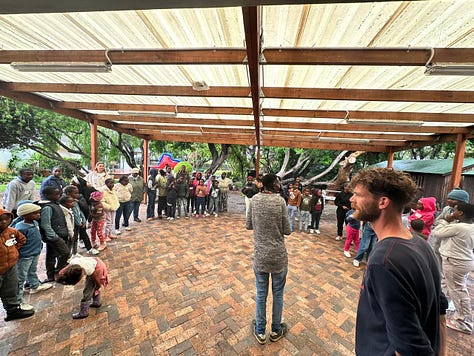
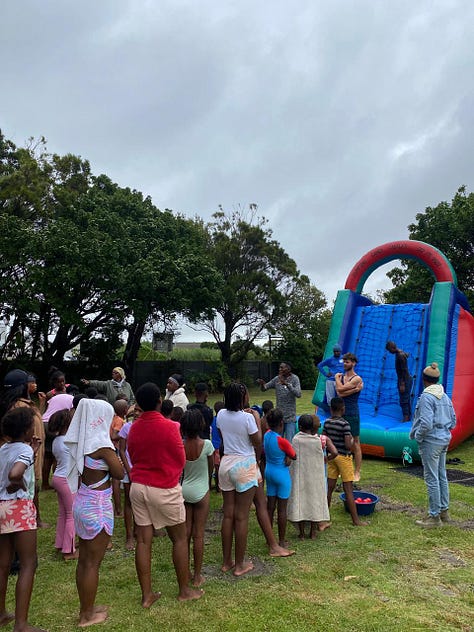


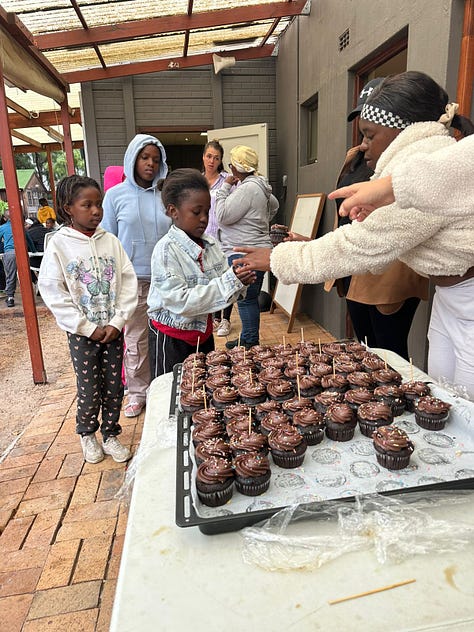

Last week we ran our yearly Christmas party. It’s become a tradition to do something exciting related to water (slides, games etc.) and this year was no different. Mid-December here though is still a bit fickle and is comparable to something like May or June in the Northern Hemisphere where you get 4 good days with a sudden cold snap.
Well, we had rented everything and bought the food only to discover that our water fight Christmas party was the rainiest day of December. Kids being kids though loved it all the same, we had an hour’s break from the rain where they all gladly enjoyed the water slide and then warmed up with boerwoers rolls (sausage sandwich kind of thing) and a Christmas story.
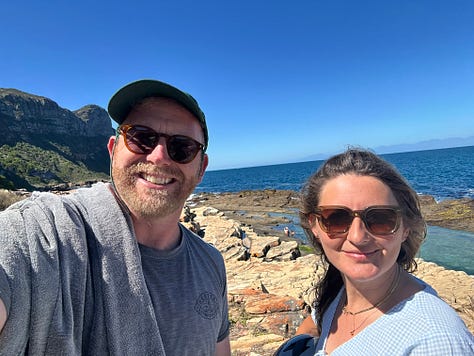


This is also Rachel’s Birthday month and we had a great day borrowing a friend’s moped and heading into the Cape Point Nature Reserve where we found a tidal pool and unexpectedly some friends who lent us snorkel gear to explore the rock pool there.
Counterintuitively, the water around Cape Town on the Atlantic side gets much colder in the summer. The predominant south-east winds blow the shallow surface water, which is warmed by the sand, back out to sea revealing sea temperatures of as low as 9-10c. Quite a contrast on a 30°c day! But we haven’t yet had a sustained week of strong southeast winds so the water has been beautifully temperate.




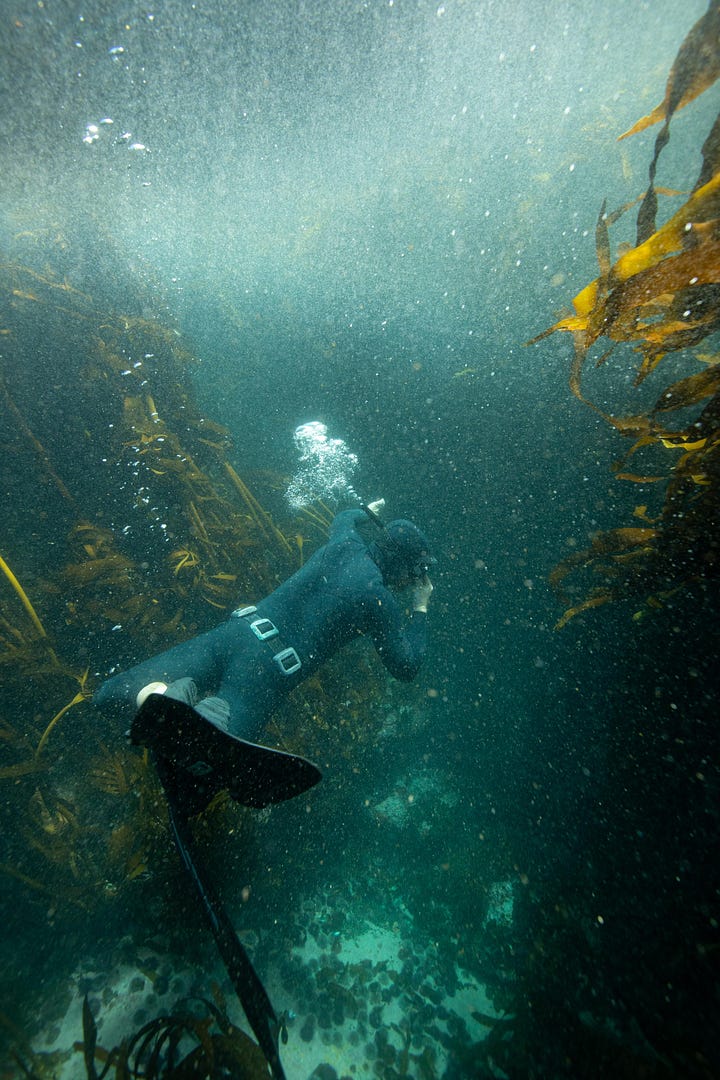
While squeezing me for good Christmas gift ideas (because apparently, you can only have so many surfboards and wetsuits), I suggested to Rachel that I’d enjoy taking a guided snorkel in the kelp forests in False Bay by a local guide here. The local guide however was off to Antarctica to lead an expedition over Christmas and so only had slots in these last weeks of December. It was an incredible revelation to see what is below you after so many years bobbing on the surface on fibreglass. I’m very grateful to my parents-in-law and brother and sister-in-law for early gifting the fun of it all and to Luke for joining!
Reading
I’ve been reading Heaven and Earth—Advent and the Incarnation by Will Willimon, who wrote Resident Aliens with Hauerwas (whom I mentioned in the last edition). It’s been good to read, if not somewhat inevitably North American in its tone and examples. Rachel’s honest take is that she found it quite dry, but I enjoyed it.
I’ve also been reading Kiwi Duke NT Professor Douglas Campbell’s “Paul: An Apostles Journey”. Academic New Testament studies is not really my home turf (as ironic as that may sound to those not acquainted with the highlight-segregated world of academic theology departments) but this has, so far, been a well-written and interesting take on Paul’s life. I’m looking forward to re-reading NT Wright’s biography of Paul again next year to see if I can spot their disagreements (which I know about by reputation).
Eating
For many years, on Rachel’s Birthday it’s been hard to beat our local restaurant’s carrot cake. Its delicious and not expensive.
But this year she requested a Danish Dream Cake.
This Danish Dream Cake (or ‘Drømmekage fra Brovst’) originates from Brovst, a village in Jutland. In 1965 a young girl baked her grandmother’s secret family recipe in a competition and won, and the cake has been a favorite of Danes ever since.
I’m much more confident cooking than baking. The difference to me feel akin to watercolours vs. painting by numbers (not to diminish the virtuoso bakers out there). Simply put, it requires detail and precision, not exactly my strong suit.
But all in all it turned out pretty well and we enthusiastically ate outrageously large slices for the days following.
Ingredients
The Base:
3 eggs
1 cup (225 g) granulated sugar
1⁄2 tsp. vanilla essence
1¾ cups (225 g) all-purpose flour or cake flour
2 tsp. baking powder
2⁄3 cup (150 ml) whole milk
3⁄4 stick (75 g) butter, melted
For the topping:
1 stick (100 g) butter
1½ cups (150 g) dried shredded coconut
1¼ cups (250 g) dark brown sugar
1⁄3 cup (75 ml) whole milk
Pinch salt
Instructions
Preheat the oven to 185°F. Prepare a 22cm (9inch) springform or round cake pan, greased and lined with baking paper.
In the bowl of a stand mixer, whisk the eggs, granulated sugar and vanilla essence on a high speed for a few minutes, until white and light. Meanwhile, in a separate bowl, sift the flour and baking powder together.
Carefully add (fold) the flour into the egg mixture. Mix the milk with the melted butter in a jug/pitcher and carefully pour into the mixer, folding it in until incorporated. Pour the batter into the prepared cake pan.
Bake in the preheated oven for 30-35 minutes, or until almost done (try not to open the oven door for the first 20 minutes of the total baking time).
To make the topping, put all the ingredients in a saucepan and gently melt together.
Remove the cake from the oven and carefully spread the topping all over the cake. Return to the oven. Turn up the heat to and bake for a further 5 minutes (until the top goldens).
Leave cake to cool before eating
Listening
It’s the time for Advent and Christmas Carols! We were grateful to join some friends for an Advent celebration at their home recently where they led us in singing “Come thou long expected Jesus” and “O Little Town of Bethlehem”.
I, however, spent most of the time confused as I recognised the tune but couldn’t quite follow it. It occurred to me that on either side of the Atlantic, we use different tunes.
Through a little bit of research, I discovered that the North American tune is actually the oldest written in 1868 (according to Wikipedia), while the Commonwealth version was adapted by composer Ralph Vaughn Williams who collected ‘folk songs’ around the UK.
Here’s the North American tune sung by Nat King Cole;
Given the lifelong presence of these Carols among anyone who has lived in the West in last 50 years, there is a deeply emotionally resonant nostalgia that emerges when one of these tunes is played which ever side of the Atlantic you’re from.
The one below was the tune I was expecting to emerge.
The legend has it that Christmas Carol services originated in Truro, Cornwall where I grew up.
The story goes that on Christmas Eve everybody in Truro would get disgustingly drunk, and that the Bishop of Truro (Benson) was so disgusted that he decided to lure everybody out of the pub and into the church with his new service.
Carols, which is a word that means to dance around, gives some indication of the roots of it. Most Christmas carols were either formed as drinking songs or at least locally known, folk tunes. In the early 1900s Ralph Vaughn Williams embarked on a project to travel around the UK to collect some of these tunes, without which there is a very high likelihood they would have been lost. Now there are a number of carols which are known by the area where the tune was discovered.
These were local songs that sometimes had roots in the early forms of nativity plays that existed from the Middle Ages onward in the UK.
The Sussex carol is a good example of a ‘locally named’ Carol;
“..the composer Vaughan Williams overheard it being sung by a Mrs Verrall from the nearby village of Monk's Gate (in Sussex) in 1904.”
My favourite of these ‘locally named’ carols is the Herefordshire Carol;
The Herefordshire Christmas Carol, [or]This is the Truth Sent from Above, was one of several folk tunes preserved and popularized by Ralph Vaughan-Williams. In 1909, he transcribed it from Ella Leather, a collector of Herefordshire folk music, who had herself recieved it from a Mr W Jenkins, a folk singer from Kings Pyon.
The text recalls the fall from grace of Adam, and the promise of redemption by Jesus. However, in almost all printed editions (including The Oxford Book of Carols and the ubiquitous Carols for Choirs), several of the verses are missing. The missing text leads to a presumably unintended faux pas, with the second verse ending ‘Woman was made with man to dwell’, and the next verse starting ‘Thus we were heirs to endless woes’!
— Ancient Groove
The full verses are available here and recount the biblical story which gives another inclination to the purpose of these songs. They formed an intentional catechetical basis for the large numbers of illiterate Christians in the early 19th-20th Century.
"The carol was increasingly associated with the poor and illiterate," said Ms Skeaping. Were it not for folk music collectors, such as Williams and Cecil Sharp, who noted and published the songs they found, she believes the carolling tradition may have been lost forever.
The most famous of these Carols is the Coventry Carol. Its bleak and almost melancholic tune is well deserved, as the story unfolds below.
“…the carol was sung in one of the medieval mystery plays performed in the city each year on the feast of Corpus Christi - the pageant of the shearmen and tailors.
"The plays are first referred to in 1392, with the earliest-known manuscript dating from 1534," she said.
Like many traditional carols, the words have a darker subtext.
"The so-called 'Coventry Carol' comes near the very end of the play, at a highly dramatic moment when the women rock their babes to sleep for fear Herod's soldier will hear them crying and slaughter them,"
— BBC
See the footage above which creates the dark WWII backdrop to what made the song so powerful in the 20th Century;
In Coventry, the carol is sung annually at the cathedral.
"For me, the really special thing about the Coventry Carol is the way it was used in 1940," said David Stone, the canon precentor.
"The cathedral was bombed on 14 November, and on Christmas Day that year the then provost broadcast live on the BBC to the world. His very famous message was that he was trying to forgive those who had done this terrible thing.
"After that, the choir sang the Coventry Carol in the ruins of the old cathedral."
He said the "shadowy" subject matter of the carol made it a particularly appropriate one for Coventry.
"The theme of redemption following suffering is part of the Coventry story," he said. And this is part, he added, of what makes the carol so special.
"It connects with people's lives as they really are," he said.
— BBC
Finally, Advent songs and Christmas Carols are not quite the same thing. Advent is filled with apocalyptic expectation while Christmas is filled with the wonder of incarnation. So for Advent I think Lo! He Comes with Clouds Descending is the best Advent Hymn;
Advent's Good News: Your Life is too Small and You Can't Work Hard Enough
Happy New Year to you! No, this Lectio wasn’t mistakenly sent out before 1st January, because we are in Advent which is the beginning of the Christian Year.
As I've said before, the way we tell the time shows us what is important to us and God comes every year disguised as Advent to disrupt our way of telling the time.
The way we tell the time has a story hidden in it about what is important. At this time of year, when most people are coming to the end of their rope, and for those of you in the Northern Hemisphere, the darkest days have begun, God shows up in Advent.
It’s not quite time yet for the baby in the manger, because the Church observes the Christmas season beginning on the 25th and ending on the 6th of January. But God shows up in Advent in the midst of the deeply human longing for the brokenness of our world and our lives to be set right.
So much Christian preaching and activity is motivated by an unspoken intuition that God has done something and now it's our turn: Reach the lost, fix your marriage, serve the poor, pray more, give more and work harder. The early church British monk Pelgaius' teaching that “we can do it all ourselves” was roundly condemned as heresy in the 5th Century, yet it seems like the temptation to live that way is perennially human. So Advent is the great rebuke of work ethic, bootstrapping, hustling and hard work.
It preaches to us once again, that we are lost, broken, weary and in the dark and that only God can set things right. Advent teaches us to remember the storyline in the run-up to the first Christmas; The longing of His people, the various creative yet unfruitful strategies of spirituality adopted in the impatience for God to show up (see Herod, Sanhedran and Rome). But Advent highlights the few faithful and simultaneously unimportant people (Simeon, Anna, Zechariah, Elizabeth, Mary, Shepherds among others) to whom God revealed His inbreaking.
If we are honest, everyone is tired from working hard for God and we'd love for Him to show up and just sort it all out. That's why Advent isn't just a remembering of the longing of the Jewish people, it’s about the longing of the human heart for God to set things right and yet God seems to be taking His time, am I right?
So Advent is a training in patience. It is a recognition that for all the complex mess in our lives and in our wider world only God will do as the healer. Patience, if it was ever easy, has become near impossible with our attention-deficit surroundings, instantaneous messaging and next-day delivery cultures. My friend John said He heard NT Wright say that of all the fruit of the Spirit, patience is the hardest one to fake. I think that is probably right.
Yet Advent is here to tell us that waiting in time is not wasting time. Waiting builds many things into us but the one worth reflecting on in this often frazzled season is the awareness that only God can fix what is broken, only God can shine a light into the darkness. Yes, we participate in that ministry in this time between the times, but it took God to come in the flesh to start this work of redemption and only His return will make it fully new again. So in the meantime, learning to faithfully wait is the primary skill of Christian life.
Waiting is not as passive as it sounds; there are the muscles of prayer, growth in the gifts and fruit of the Spirit, and trust in God despite what surrounds us. These are the things we are given time for. We are reminded in Advent also, that we are not alone in the waiting. We have ancestors, if you like, people in History who have shown us how to wait; Zechariah, Anna, Elizabeth, Mary, and John as I mentioned before. What each of their stories, which are so often remembered and read in this Advent season is that, the freedom we long for, amongst many other things, is also a freedom from ourselves.
The Advent story, running into the Christmas story is that God has done, is doing and will do something truly cosmic. It's the good news that your life, your story, does not have to carry the unbearable burden of being significant on its own.
You have been joined to a grander story that, yes, counts you as important, but not more important than God. Rebellion and Redemption are themes of your individual life, yes, but only because you are caught up in a drama much more wonderful than just your individual life. This might strike you as something obvious, even easy to piously affirm but consider the moments when you are in pain or in great need. This reality becomes harder to live in light of.
In the midst of our deeply felt needs our default mode is to turn into spiritual narcissists. In our broadly narcissistic culture, the Church has been tempted, and often given into, the pressure to make the gospel and the story of God “relevant” to people’s individual lives.
Of course, the inclination to connect the gospel to individual lives is a deeply important one, but the invitation is not to come to Jesus to have your life made better again but to come and lose it. In so doing, you actually find it.
Again, many of our sermons and activities seem predicated on the implicit idea that your singular life is the centre of the Universe and God is reduced to a mere fairy godmother. But Jesus' invitation is to be made free by transcending the claustrophobic constraints of your individual story and its circumstances and to know the liberation of being part of God's story. As we do that, we realise God’s story was the loving context our individual stories most deeply desired all along.
So much Christian unhappiness is quite simply the result of losing perspective. When we think our lives are the centre of the universe, that our worries and pains are worse than others, we have fallen into a lesser story. Advent comes to tell us “Wake Up! God is doing something big, bigger than you, but it catches you up too!”. Yes, this is said with the loving compassion of God, but also with the insistence and urgency of a parent urging their child not to run into traffic. We are reminded to wake up to God’s story, to breathe out our worries, and to breathe in God’s redeeming reality. Only by giving up our fixation on our own individual stories can we be freed to know the joy and liberation of being part of something so much bigger, the Story of the people of God.
I've been on the front row of tragedy, pain and loss enough to know that a human life alone cannot bear the weight of carrying all the truth, reconciliation and redemption that we are promised in the fullness of God's story. God’s love for you is indescribable in its depth, but it is a love that liberates us into a greater hope than simply the circumstances of our lives being fixed here and now.
Advent is here to remind us that our hope is in something greater than our circumstances being changed. The Hope that God gives is the hope of the people of God throughout history. A people who are not looking for the fulfilment of the good life now, but "looking for the city which has foundations, whose architect and builder is God" (Heb 11). Our circumstances, our individual lives, are not a big enough canvas to perceive the work of redemption at play which Advent announces and Christmas is the foretaste of.
This Advent, zoom out with me to the big picture of what God is doing and be freed from the life you were called to lose anyway and refuse to be offended at the God who never offered to be your divine vending machine. The high point of Spiritual maturity is self-forgetfulness. Even in pain and loss, we can lift our eyes, trust in God and refuse the worry and spiritual narcissism that weigh us down. Jesus promises us that if you want to save your own life, you will lose it; but if you lose your life for His sake, you will find it.
May that be true for you this Advent.
That’s all for now…



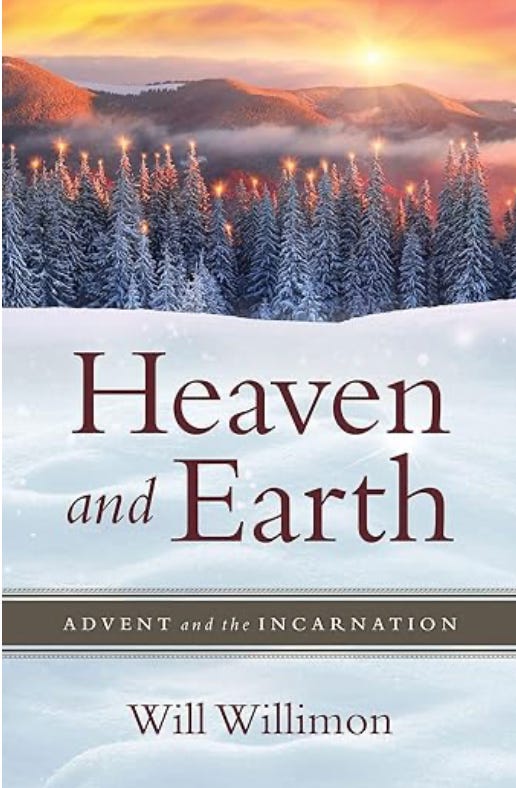




Bless you dear Liam. I love your mind and heart for Jesus Special Happy Birthday (late) to Rachel.